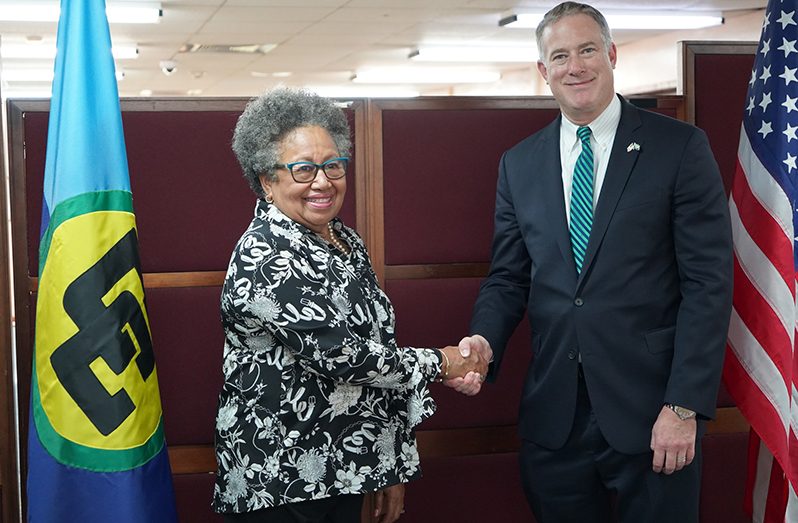IN response to the interconnected challenges of transnational criminal organisations, the United States is actively working to combat illicit firearm trafficking in the Caribbean through a comprehensive approach that focuses on law enforcement.
This is according to Deputy Assistant Secretary of Defence for the Western Hemisphere at the United States Department of Defence, Daniel P. Erikson, during an interview with local journalists at the US Embassy in Georgetown on Tuesday.
The US government, Erikson explained, views this issue primarily as a law enforcement challenge and is dedicated to providing the prosecutorial assets to investigate and prosecute cases of illegal firearm trafficking in the region.
During his two-day visit to Guyana, Erikson shared crucial insights into the US government’s approach to combating transnational criminal organisations involved in the trafficking of firearms.
The interview shed light on the significance of addressing this challenge not only as a military concern but also as a legal and law enforcement issue.
Erikson underscored the complex nature of the problem, stating, “The challenges posed by transnational criminal organisations are not just military challenges. They also require a whole-of-government response, working with our partners in the region.”
He highlighted the interconnectedness of illicit firearms trafficking with broader issues, such as the drug and narcotics trade, highlighting the need for a comprehensive strategy.
The Deputy Assistant Secretary of Defence acknowledged the prevalence of firearms trafficking throughout the Caribbean, linking it to criminal networks and transnational criminal organisations.
“We recognise that this is a big concern throughout the Caribbean, tied to illicit criminal networks and certainly linked to the overall drug and narcotics trade in the region,” he said.
Erikson’s visit to Guyana included discussions on collaborative efforts to combat transnational criminal organisations and enhance security in the region.
He mentioned ongoing cooperation with partners in the Caribbean to strengthen maritime domain awareness and counter the influence of criminal organisations.
When asked about the US government’s stance on military bases in the region, Erikson highlighted the multifaceted nature of the challenge, indicating that it requires a holistic response.
“The United States views the challenges posed by transnational criminal organisations as ones that are not just military challenges but also legal and law enforcement challenges,” he stated.
While reflecting on the ongoing efforts, Erikson made it clear that, at this juncture, there are no expected changes in the overall force posture of the United States in the Caribbean.
The emphasis remains on assessing the situation as it evolves and maintaining a strong bilateral relationship with countries like Guyana.
During his visit to Guyana, Erikson met with the Secretary General to the Caribbean Community (CARICOM), Dr Carla Barnett to discuss areas of mutual interest such as regional security, climate change, disaster preparedness and health assistance, capacity building to support the Caribbean Basin Security Initiative (CBSI), counter-narcotics detection, monitoring and information sharing.
“We talked about a range of CARICOM concerns and initiatives in the Western Hemisphere. We had a very good discussion on the role that the Caribbean community is playing with regard to bringing greater stability and security…
We also discussed many of the initiatives that we’re pursuing in order to build up greater collaboration between the United States and the Caribbean community on a range of security and defence issues,” he explained.
The senior US official explained that these defence issues highlighted the need to have greater maritime domain awareness and to work together to combat transnational criminal organisations and their influence in the region.
Firearm trafficking in the Caribbean is a significant concern, with reports indicating that illegal guns are fueling high homicide levels in the region.
Traffickers employ various methods to smuggle weapons into the Caribbean, including using small-scale trafficking networks that often originate from the United States.
Handguns are prevalent and make up the majority of seized weapons, with some seizures of high-powered rifles and ammunition.
As such, the United States is cooperating with Caribbean nations to address this issue, with efforts focused on investigating firearms and ammunition smuggling, human trafficking, and transnational gang activity.
The U.S. Bureau of Alcohol, Tobacco, Firearms, and Explosives (ATF) has attachés in Jamaica, the Bahamas, and Trinidad dedicated to investigating firearms trafficking.
Now, Caribbean countries are taking steps to slow the traffic of illegal weapons, including vowing to ban civilian assault weapons across the region and standing against arms trafficking.
The average rate of violent deaths in the Caribbean Community (Caricom) region is nearly triple the global average, with gun violence particularly acute in some countries.
Even with strict gun ownership regulations and limited domestic manufacturing, the area still faces significant levels of gun violence, primarily due to the influx of firearms smuggled from the United States.


.jpg)











